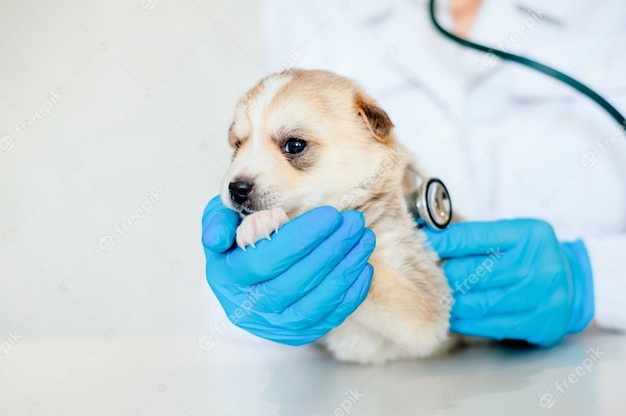When Should You Get A Puppy ?
Aside from the obvious answer of avoiding getting a dog until you're ready, the best time to have a dog is when you've completed your dog training. When the puppy is ready, of course.
The puppy's age is a crucial factor to consider. Most pups will move from their birth home to the homes of their new human partners at some point throughout their lives. The best timing for a puppy to move homes is determined by a number of factors, including his emotional requirements, his crucial socialisation timetable, and the amount of canine knowledge in each family.
Leaving home may be difficult, and reducing the emotional damage experienced by the dog is a top priority. The puppy will lose out on early pup-pup and pup-mother interactions if he leaves home too early. And, because the early weeks in a new home are frequently spent in a doggie social vacuum, the growing puppy may grow up undersocialized toward his own species. On the other side, the longer a puppy stays in his first home, the more devoted he develops to his canine family, and the more difficult the transfer will be. A postponed transfer also delays crucial socialising with the new family.
It's long been thought that the best time to get a new puppy is when it's eight weeks old. By the time the puppy is eight weeks old, he has had enough dog-dog socialisation with his mother and littermates to tide him over until he is old enough to safely meet and play with other dogs in puppy class and dog parks. Despite this, the puppy is still young enough to build a close attachment with his new family members.
Eight weeks is the ideal age for many pups.
The relative level of canine experience in each family is an important factor to consider when deciding whether the puppy should stay longer in his original home or move in with his new owners sooner. Because it is commonly considered that breeders are experts and owners are amateurs, it makes sense to keep the puppy with the breeder for as long as feasible. A responsible breeder is more likely to socialise, housetrain, and chewtoy-train the puppy. If this is the case, getting the puppy when he is older makes sense. (In fact, I frequently ask new dog owners whether they've considered a socially mature and well-trained older dog instead of a puppy.)
Of course, this assumes the breeder's greater knowledge. Unfortunately, just as there are good, average, inexperienced, and irresponsible owners, there are good, average, inexperienced, and irresponsible breeders. With an experienced owner and a below-average breeder, the puppy would be best suited relocating to his new home as soon as possible, at the very latest by six to eight weeks. Look elsewhere if you believe you are a qualified puppy raiser but the breeder would not allow you take your puppy home before it is eight weeks old. Keep in mind that you're looking for a puppy to live with you, not with a breeder.In fact, a less-than-average breeder is likely to produce less-than-average puppies, so you might be better off seeking elsewhere.
Puppy Growth Stages
Puppy growth is similar to that of human children. Puppies go through a variety of phases as they grow. While certain breeds progress more slowly in terms of physical development, when it comes to a puppy's mental development, it's acceptable to generalise regardless of breed.
Here's a quick rundown of a puppy's developmental stages:
Birth to 8 weeks
The first eight weeks of a puppy's existence are critical. With the guidance of their mother and littermates, they learn to get along with other dogs at this age.
Puppies learn to control their bite at this time, which is crucial if they are to get along with other dogs and people in the future. The puppy's mother and siblings will make it clear that a strong bite is not acceptable. They'll also learn to interact with humans through playing, sharing, and being handled.
Puppies acquire a lot of their personality within the first 4 to 7 weeks of life, according to Williams, so think about how that pup has been reared and the qualities that they are currently displaying when thinking about buying or adopting one.
8 to 16 weeks
The next stage of a puppy's existence is when they learn to form human bonds. During this time, most pups join a human family and learn how to interact with people and other pets, as well as house rules.
At this age, puppies are incredibly trainable. They're also incredibly impressionable, especially between the ages of 8 and 12, when they're going through the fear stage. A poor encounter during this time might have long-term consequences for a dog.
"During the 7 to 12 week period, the puppies I breed acquire a lot of socialisation," Williams explains. "They have adult dog relationships, interactive toys and dog toys that make them think, as well as human attention." They begin to learn to go pee outdoors, get their hair brushed and their nails done, and even have their first bath. They are encouraged to share and play nicely with others."
17 weeks to 8 months
Puppies learn to establish themselves throughout this time. They become more self-reliant, easily distracted, and may not listen well. During this time, it's critical to teach your puppy obedience commands so that they regard you as a leader and grow up to be a well-behaved dog. Positive reinforcement is a considerably more effective and compassionate approach of training than fear or punishment-based strategies.
Puppies have a great need to chew during this time, and they must have access to safe chew toys in order to avoid causing harm.
9 to 16 months
Even though puppies appear to be adults at this point, they are still termed puppies. To learn to feel at ease in the environment, they require constant instruction and plenty of pleasant socialising.
Are You Ready for a Puppy?
Puppies are adorable, but they take a lot of effort to care for. If you've never owned a puppy before, you may not understand what you're in for. Being prepared to have a dog, especially an older dog, is one thing. Raising a puppy necessitates an even greater amount of dedication.
Puppies should be fed three to four times a day when they are young. They must be put outdoors as soon as possible after eating or drinking so that they may properly defecate and get house trained. While they are still being house-trained, puppies will have accidents in the house. This can result in a significant amount of cleanup.
During the night, a puppy may wake you up multiple times. It might be due to the puppy's urge to go outside, or it could just be due to boredom.
It's impossible to leave a young puppy alone for more than a few hours. When left alone, the puppy should be kept in a crate to help with house training and prevent the puppy from chewing up everything in the house. A puppy, on the other hand, can't retain its bladder for more than a few hours (and sometimes bowels too).
Puppies have the potential to cause havoc. They like to investigate, chew, lick, and potentially ingest the objects in their surroundings. They have no sense of propriety and may be obnoxious or hyperactive. Puppies must be taught and socialised, as well as given enough of exercise. These items take a long time to complete.
Are you willing to return home from work in the middle of the day to care for your puppy? Are you prepared to be awoken in the middle of the night? Are you willing to devote a few hours per week to training and socialisation? What about your other pets or family members? Will a puppy be too much trouble?
If you buy a puppy while it's small, expect to spend a lot of time with it, especially in the first few months. If all of this is too much for you, but you still want a dog, try adopting an older dog.
What Kind of Puppy Is Right for You?
So you've assessed the benefits and drawbacks of puppy ownership and determined that now is the ideal moment to welcome a puppy into your home. Congratulations! It's now time to go find your new little friend. Where do you begin, though?
First and foremost, determine which breed of puppy is best for you. Make a list of the characteristics or characteristics you absolutely must have, those you like, and those you absolutely do not want.
- Do you want your dog to be large or small? Small dogs typically thrive in cramped quarters. Large and huge dogs cost more in terms of food, supplies, and medications.
- Do you want an energetic dog as an adult, or one that will likely quiet down in a year or two? How much physical activity can you provide?
- Take into account the type of hair coat as well. Are you willing to go through the process of shedding? Do you want a dog that sheds very little, or do you want a dog that sheds a lot? Low-shedding dogs need to go to the groomer on a frequent basis. Is this something you can afford?
Summer is Beneficial
Most dog owners and dog sitters believe that the best time to add a four-legged buddy to your family is in the spring or summer. The warmer months are perfect for housebreaking your puppy, as well as providing you with longer and sunny days for walks and fun.
For breeds that are sensitive to cold temperatures, the fall and winter months can be challenging. Also, keep in mind that house training is more difficult in the winter. (Consider how much you dislike going outdoors when it's dark, cold, or raining outside—your dog is likely to feel the same way.) The stress of holiday shopping, travel, and family reunions fills the months leading up to the end of the year.
Period of Socialization
The socialisation stage is a major consideration when deciding when to place a puppy in a new home. Dr. Sally Foote, a veterinarian and behaviourist, says that the socialising stage in pups usually lasts between 6 and 14 weeks.
Puppies learn the rules of the world around them at this period, and they acquire attitudes and behaviours that they will carry into adulthood. According to the American Veterinary Society of Animal Behavior, pups should be introduced to as many different people, animals, stimuli, and situations as safely possible without overstimulating them.
During this stage, a puppy's socialisation has a significant impact on the dog's behaviour, confidence, and attachments for the rest of his life. It's also at this period that the puppy will build a close bond with the people who will be caring for him.
Learning From Littermates
Puppies also have a main socialising stage, which begins when they become more aware of the world around them about 3 to 5 weeks of age, according to some animal behaviourists. Puppies learn proper play activities and how to interact with and relate to other dogs from their mother and littermates.
They also pick up rudimentary impulse control and biting inhibition from their siblings and mother's feedback.
Puppy litters that are separated from their litters early are more likely to demonstrate behavioural and temperament issues as adults, such as being scared, aggressive, or nervous; protecting their food and toys; and being very reactive and difficult to teach.
Puppies that spend too much time with their littermates, on the other hand, may acquire dominant or submissive habits, which can lead to difficulties.
Puppy-Proof Your Home
It is critical that you prepare your house before your small companion arrives. Make every effort to puppy-proof your whole home. Destructive puppy behaviour is typical, annoying, and sometimes hazardous to your dog. Your dog will undoubtedly seek out all of the small dangers.
Keeping an eye on your puppy at all times is the greatest way to keep it safe. While you're gone, keep your puppy in a crate (just avoid leaving for more than a few hours when your puppy is still young). A puppy should not be given complete control of the house until it is older and more well-trained.
WARNING
Look for dangers from the perspective of a puppy:
- As much as possible, conceal any electrical cables.
- Lock cabinets that store food or drugs, poisonous chemicals, or other potentially harmful home objects.
- Keep houseplants up high where your dog won't be able to gnaw on them.
- Purchase a garbage can with a lockable cover or store the bin behind locked doors.
- Laundry, shoes, and other small objects should be kept out of reach. These are sometimes chewed on and/or swallowed by puppies.
Stock up on Puppy Supplies
Before you bring your new puppy home, you'll need a lot of dog supplies. Before you wind up with a bunch of items you don't need, such as toys your puppy won't play with or beds your dog won't sleep in, start with the essentials. To get started, you'll need the following items:
- A four- to six-foot leash is a good starting point (later you can get an extra-long one for training)
- Collar with ID tags that may be adjusted
- Pet food and water dishes made of metal or ceramic (avoid plastic as it may cause skin irritation1 and is easy for puppies to chew up)
- Food for puppies
- Simple dog bed with plenty of room for growth
- Crate for your dog with plenty of room to grow
- a couple of easy dog toys (try one of each: a squeaky toy, a plush toy, a chew toy)
- Brushes, combs, and grooming mitts that are suitable for your puppy's coat
Other goods, including as grooming supplies and preventative treatments, will become necessary as your puppy matures. Your veterinarian can assist you in determining which items are most appropriate for your dog's needs.
Puppy Care for Breeders
It's critical to make sure you're comfortable with the breeder's decisions before purchasing a puppy. Find out how your puppy will be handled by the breeder in terms of weaning, socialisation, and when the puppy will be ready to go home with you.
Working Shetland Sheepdogs breeder During the socialising stage, Claire Apple prefers to keep her puppies at home. At the age of 12 weeks, her puppies are placed in working or sporting homes. She does this so she can control the experiences her puppies have during their fear and socialisation stages, as well as begin the targeted training they will require in their future homes.
Puppy socialisation should begin as soon as possible. Good breeders gradually expose their pups to children and other people, as well as vehicle trips, crate time, noises, surfaces, grooming equipment, solid food, and the outdoors, while giving them personalised attention. They allow pups to have new experiences, recuperate from frightening events, and learn to appreciate being handled while starting to form human ties.
When the puppies are ready to go to their new homes, breeders may teach them how to socialise them appropriately and safely without overloading or upsetting them.
Prepare a Space
Aside with nutritious food, training treats, and a nice leash and collar, you'll want to be sure to set up a safe "puppy zone" in your home so it's ready for the newcomer. You'll need the following items:
- If you're crate training, you'll need a crate.
- Gates for children! If your dog isn't a jumper, this pet gate is a fun, standalone option. You'll need something more if she is.
- Items that are warm and inviting, such as blankets or worn clothing.
- At the very least, there should be one bed, such as this orthopaedic pet mattress. A chew-proof bed, such as the K9 Ballistics series, may be required. This is a comprehensive list of additional choices.
- Pads for the toilet.
- There are plenty of safe toys and chews available.
Weaning
Another aspect in deciding when a puppy can leave the litter is weaning. "Most puppies start transitioning from their mother's milk to solid food between the ages of three and five weeks," says Dr. Jerry Klein, AKC chief veterinary officer.
"This procedure might take a few weeks and can be traumatic for the puppies." Puppies should not be taken home until they are able to feed on their own. Puppies that are denied the opportunity to suckle for nourishment and comfort may develop insecure tendencies later in life."
Various Dogs, Various Situations
Because toy breed puppies are so little and delicate, some breeders may opt to retain them over the 8-week mark.
If a puppy must travel a long distance to its new home, especially by airline, the breeder may choose to wait until the puppy has gotten the majority of vaccines and is better prepared to manage the physical and mental stress of travel.
According to one experienced dog trainer and specialist on canine development, the best age for a puppy to be introduced to its new owner is about 8 to 9 weeks, when the puppy is ready to form a solid attachment. The puppy, however, may benefit from being with its littermates for a little longer if the breeder is spending a lot of time and energy socialising and teaching the youngster, according to the same expert.
Where to Find Your New Puppy
It's time to start looking for a puppy once you've figured out what kind of dog you want.
Consider adopting a dog first if at all feasible. Mixed-breed dogs are really amazing and underappreciated. Your nearby animal shelters and puppy rescue corporations have lovable mixed-breed dogs simply anticipating homes.Even if you're not sure if a mixed breed dog is right for you, visiting a local shelter or rescue group to see several pups is worthwhile. It's possible that you'll fall in love!
You could be dead bent on getting a purebred dog. Many individuals have a favourite breed or want to know what to anticipate when their dog reaches adulthood. In a purebred dog, characteristics such as size and coat type are extremely predictable. Health issues, temperament, and energy levels are all fairly predictable, but not always.
If you decide to get a purebred dog, you must be responsible. Look for a reputable dog breeder with a lot of expertise. Backyard breeders should be avoided. Never buy a dog from a pet store since they are typically from puppy mills. Don't buy a puppy from a flea market or a classified ad since the puppies' histories are unknown and they might be ill.
It will just seem right when you locate the correct dog for you. The majority of dog owners will tell you that their pets selected them, not the other way around!
Steps To Bring Your Puppy Home
1.Do your research before you buy
You wouldn't buy a home or a car without giving it a lot of thought. Buying a dog is the same way. The more time and consideration you give it now, the brighter your future together will be.
If you're thinking about getting a puppy, the best place to start is by looking at breeds and breeders. If you want to double-check, go to the Kennel Club Assured Breeder Scheme for information on breeders.
Be wary of internet advertisements. Puppies smuggled into the UK illegally are frequently sold online to naïve dog lovers.
Learn more about puppy smuggling and the negative consequences for pups and prospective dog owners.
2.Ask the breeder questions
Before you go, call the vendor and discuss your options. Ask a lot of questions about the puppy, and be prepared to answer a lot of them. A good breeder should be just as interested in you as you are in them.
Make sure you meet at the puppy's home when you schedule a meeting. If the vendor wishes to transport the dog or meet at a different place, you should be wary.
3. Meet the pup … and their family
When you first meet your puppy, inquire about their mother. It's crucial to be able to observe your puppy interacting with their mother and other littermates (if any).
This indicates that they've been adequately bred.
Inquire about both parents' medical histories.
4.Take your time
More than one visit is recommended. Don't feel compelled to make a decision right away. A well-informed decision is preferable to a hasty one.
If something doesn't seem or feel right, walk away. We understand how difficult this may be, especially if you've already fallen in love with a lovely puppy. But it's the best you can do right now.
Please call the RSPCA if you have any concerns about the welfare of any of the dogs you observe (SSPCA in Scotland)
Report the vendor to your local authority's Trading Standards division if you have any further issues about how the puppy is being sold.
5.Paperwork and health
Inquire about any vet checks, immunizations (if necessary), microchipping, and/or pedigree documents.
Keep in mind that the puppy should be at least eight weeks old when you take it home.
A respectable breeder would never send you home with a puppy under the age of six months.
Learn How to Raise Your Puppy Correctly
Puppies require extra attention to ensure that they grow up to be healthy and happy.
- Choose a puppy-specific diet that is high in nutrients.
- Begin house training your dog as soon as you get him home. Be aware that this might take several weeks or months.
- Start small with your obedience training at home. Be patient and constant in your approach. Don't be too rigid, though; let your puppy be a puppy!
- Make sure your dog is well socialised. Take your puppy to a variety of locations so that it may become acquainted with various sights, noises, people, and pets. However, only allow your puppy to interact with healthy, vaccinated dogs.
- Enroll in puppy training lessons with a reputable trainer. This will not only help your puppy learn, but it will also let him to socialise.
- Make a workout programme a part of your daily routine.
- Maintain a regular schedule for puppy vet appointments and vaccinations.
- Make time for play and connection. You can even play games with your pet.
Set up the framework ahead of time if there will be more than one person in your home who will interact with the puppy. When does the puppy be fed and walked, and who is responsible for it? Ascertain that all parties agree on the puppy's travel restrictions. Collaborate to ensure that the training is consistent. If you have children, make sure they understand how to act around dogs. If there are other pets in the house, make sure they've been properly introduced and are always supervised.
Find the Right Veterinarian
Within a few days of being home with you, your new puppy should see your veterinarian for the first time. Even if no immunizations are due, it is vital for the puppy to get a physical examination. This is an opportunity to ensure that the breeder, shelter, or rescue organisation did not miss any health issues.
It's crucial to select a reputable veterinarian before bringing your puppy home. You won't have to hustle to get a vet since you'll already have one set up. Look for a veterinarian clinic with a good reputation and a location that is convenient for you. Check to see whether their rates are within your budget. Asking around and doing research are the greatest ways to discover a decent veterinarian. Consult with pet-owning friends and family members. Take a look at the internet reviews. You might wish to go on a tour of the hospital and meet some of the personnel to get a sense of the location.
Bring all of the papers supplied by the breeder or adoption group with you on your puppy's first visit. Your veterinarian will examine your puppy and go over the puppy immunisation regimen with you. Puppies require many fundamental immunizations starting at the age of six weeks. Some immunizations require a booster shot within a year after the final dose in the first series.
When Is a Rescue Puppy Ready for Adoption?
Puppies from a rescue scenario, on the other hand, may need to find a permanent home as quickly as possible, depending on the circumstances.
"Rescue pups in bad situations or orphaned puppies may not be in a scenario where they can acquire human and animal connection, so adopting sooner rather than later is generally healthier for them," Williams adds.
Bringing a puppy home, whether it has just left his mother or is approaching adulthood, is a big responsibility. Every puppy, regardless of age, need socialisation and constant training in order to mature into the finest dog possible.
When Can You Take Time Off?
Get a puppy when you'll be able to establish a schedule for your new dog. You should think about taking time off to vacation with your puppy during these early months. Remember that dogs are group animals that like being a part of the family. Separating your puppy from you soon after being a member of the family may be difficult for him.
At the end of the day, acquire your puppy when you have some free time to spend bonding, training, and snuggling. It will take some time for you both to acclimate to one other. As you get to know one other's personalities and create place in your life for an enthusiastic canine family member, there may be some ups and downs.
Fortunately, you may still experience the affection of a dog even if you have a hectic job schedule, frequent travel plans, or just too much to do and not enough time. That's because finding and booking high-quality, specialised pet care in your area is now easier than ever.
Legal Constraints
Some states have rules stating that pups must be at least 8 weeks old before being sold to the general public. A total of 15 of the 28 states deem it illegal to sell an underage puppy.
Nonprofit animal shelters and humane groups are frequently exempt from these restrictions. The regulations only apply to pet dealers, retail pet stores, and pet breeders in several states.














